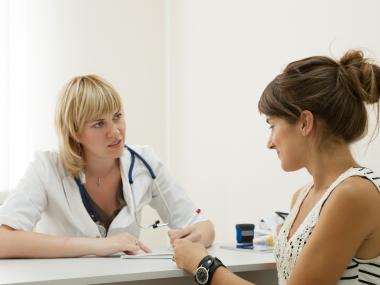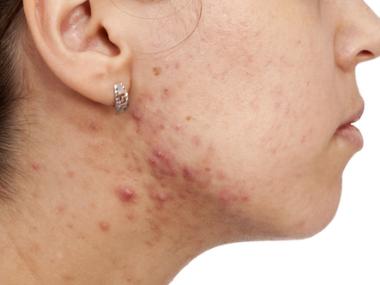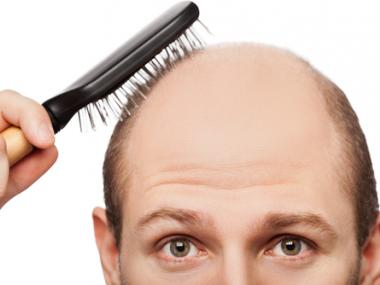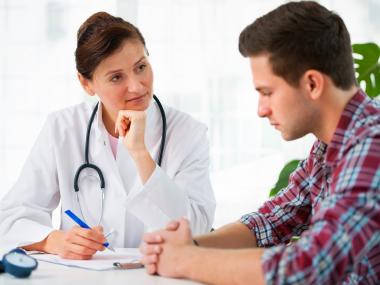How to Treat Polycystic Ovarian Syndrome (PCOS)
Up to 10% of women are thought to have the hormonal imbalance known as Polycystic Ovarian Syndrome (PCOS). It can cause irregular periods, female infertility, weight gain, acne, and excess body hair. What is it? Why is it important? And how can you get rid of it? Read on to learn more.

Are you a woman suffering from the following constellation of symptoms?
Difficulty losing weight
- Carrying extra weight in the central portion of the body (hips, thighs, stomach)
- Irregular menstrual cycles
- Acne
- Excess body or facial hair (a term we refer to as “hirsutism”)
- Difficulty conceiving
- Prediabetes
- Family history of diabetes
If so, you may suffer from a very common hormonal imbalance referred to as Polycystic Ovarian Syndrome (PCOS).
Doctors are actually just realizing how common this endocrinological disorder really is. So common, in fact, that up to 10% of women are thought to have PCOS (yep, that’s 1 in 10 women!). What is it? Why is it important? And how can you get rid of it? Let’s find out in today’s episode.
Sponsor: This episode of House Call Doctor is brought to you by the audiobook edition of Resistant by Michael Palmer. In this heart-stopping medical thriller, Dr. Lou Welcome is faced with a serious epidemic and the sinister group behind it. Listen to an excerpt at www.macmillanaudio.com/ResistantAudio.
What Is PCOS?
The top cause of irregular periods in young women is Polycystic Ovarian Syndrome (PCOS). The name is a misnomer – meaning that “cysts in the ovaries” is not a defining feature of this condition. Many women have ovarian cysts, but don’t have PCOS. So what are the PCOS defining features, then?
What Are the Signs and Symptoms of PCOS?
Here are some common features of PCOS:
-
Excess weight: Being overweight or obese (medically determined by the Body Mass Index, or BMI) and carrying the majority of the weight in the mid-section, is a common feature of PCOS. Most women with PCOS will tell me that their symptoms seemed to have gone out of control after gaining weight, and that they seem to have an unusually difficult time losing the weight.
-
Acne: Acne on the face and upper back are also a common feature of PCOS. Some patients even say that the acne seemed to suddenly come out of nowhere when they were adults, and that ironically, they didn’t experience such out of control acne during their teenage years.
-
Hirsutism: Hair growth on the upper lip, chin, stomach, breasts, feet ,and perhaps other places that women feel is unusual is also found in PCOS. A little bit of peach fuzz here and there may be normal, but most women with PCOS tell me that it is severe enough that it interferes with their quality of life.
-
Acanthosis Nigracans: In this condition, the back of the neck takes on a thickened, dark brown, leather-like quality. Acanthosis Nigracans is often a sign of prediabetes or diabetes. It can also be less frequently found in some other body parts – such as underneath the arms or the inner thighs.
How Is PCOS Diagnosed?
For those with irregular periods, or any of the other symptoms of PCOS, it’s important to rule out other potential causes, such as thyroid disorders. But a few other blood tests may also be useful:
-
Testosterone level: Women with PCOS tend to have higher testosterone levels than what is considered normal. High testosterone causes women with PCOS to exhibit traditionally “male-like” qualities – such as acne, excess hair growth in awkward places, and possibly even some diffuse thinning of the hair on the scalp.
-
Elevated blood sugar: One of the defining features of PCOS is a phenomenon called “insulin resistance,” meaning there’s an elevated amount of insulin in the body as a result of the cells not responding well enough to circulating insulin. This elevated insulin attacks the ovaries and causes the ovaries to produce more testosterone. Insulin resistance is quite common in those with prediabetes and diabetes, and women with PCOS have a greater tendency to develop diabetes later in life if they are not careful. The most commonly run test to check for prediabetes or diabetes is a test called the “hemoglobin A1C.”
-
Elevated LH/FSH ratio: There are two hormones referred to as “Leutinizing Hormone” (LH) and “Follicle Stimulating Hormone” (FSH) that may be measured in the blood stream. When the LH to FSH ratio is over 2:1, then PCOS is more likely.
In spite of these available tests, diagnosing PCOS can sometimes be tricky. There is a subset of women with PCOS whose labs are normal, particularly if they are already on hormonal contraceptives. Therefore the labs are simply an adjunct to the constellation of signs and symptoms mentioned previously.
What Are the Consequences of PCOS?
So, what does it mean to have PCOS? Women with PCOS have a greater propensity towards diabetes. It’s really important for them to exercise, eat right, and be at a normal healthy weight in order to prevent diabetes.
Women with PCOS may have a higher risk of endometrial cancer if they don’t have regular periods.
PCOS can also make it a little more difficult to get pregnant, but pregnancy is usually very achievable with the right treatments.
Lastly, women with PCOS may have a higher risk of endometrial cancer if they don’t have regular periods. It’s important to have a period (but only if you are not on hormones) at least once every three months in order to allow the lining of your uterus to shed. If it doesn’t shed, cells can build up and place you at risk for cancer of the uterus later in life.
What Is the Treatment for PCOS?
There are many ways to treat PCOS. But the mainstay of treatment is really weight loss. Here are two tips to self-treat your PCOS:
-
Maintain a lower carbohydrate diet. Like diabetics, PCOS women don’t metabolize sugar and carbohydrates efficiently. So it’s key to limit foods like bread, pasta, potatoes, rice, and sweets. You shouldn’t eliminate them altogether, but do try and keep a balanced diet that is not high in carbs. Check out Nutrition Diva’s episodes on the Mediterranean Diet and other Low Carb Diets for more tips on how to go low carb without feeling hungry.
-
Exercise: Studies have shown that getting regular cardiovascular exercise improves insulin resistance, thereby improving PCOS and causing weight loss. Exercise at least 30 minutes on most days of the week. If the treadmill isn’t your cup of tea, try fast walking, running, biking, swimming, or any other fun physical activity that gets your heart racing.
With even a 10% weight loss, you’ll notice that your acne and body hair will improve, your periods will become more regular, your sugar levels will normalize, and you will be more likely to conceive (if that’s something you’re seeking to do).
Medications for PCOS
If the above methods are not sufficient, there are a few medical prescriptions to help women with PCOS:
-
Hormonal contraceptives: If you are not trying to get pregnant, this will help you regulate your periods and improve your acne and abnormal hair growth.
-
Metformin: This medication has been used to treat diabetics and is also FDA approved for women with PCOS. It helps with weight loss—as long as you are taking care of your diet and exercise–and it also helps women with PCOS ovulate and get pregnant.
-
Spironolactone: This is normally a blood pressure medication that also works to lower testosterone levels, thereby improving acne and excessive hair growth. However, women who are trying to get pregnant cannot take it due to potential harmful effects on the fetus.
Please note that all content here is strictly for informational purposes only. This content does not substitute any medical advice, and does not replace any medical judgment or reasoning by your own personal health provider. Please always seek a licensed physician in your area regarding all health related questions and issues.
Acne, sad woman, and glucose vegetables images courtesy of Shutterstock.

 Difficulty losing weight
Difficulty losing weight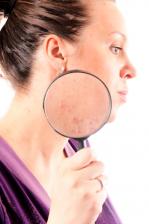 Excess weight: Being overweight or obese (medically determined by the Body Mass Index, or BMI) and carrying the majority of the weight in the mid-section, is a common feature of PCOS. Most women with PCOS will tell me that their symptoms seemed to have gone out of control after gaining weight, and that they seem to have an unusually difficult time losing the weight.
Excess weight: Being overweight or obese (medically determined by the Body Mass Index, or BMI) and carrying the majority of the weight in the mid-section, is a common feature of PCOS. Most women with PCOS will tell me that their symptoms seemed to have gone out of control after gaining weight, and that they seem to have an unusually difficult time losing the weight. Testosterone level: Women with PCOS tend to have
Testosterone level: Women with PCOS tend to have 